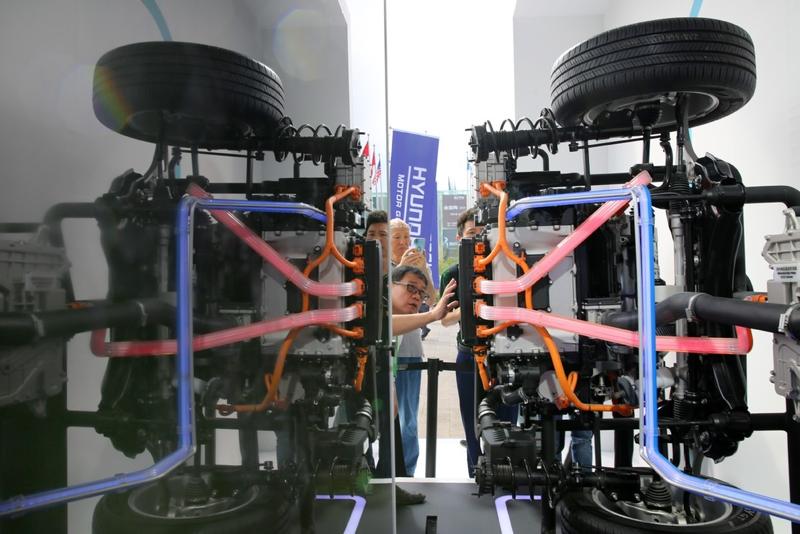 Visitors check out a hydrogen energy vehicle during a high-tech exhibition in Rugao, Jiangsu province. (XU CONGJUN / FOR CHINA DAILY)
Visitors check out a hydrogen energy vehicle during a high-tech exhibition in Rugao, Jiangsu province. (XU CONGJUN / FOR CHINA DAILY)
Industry insiders believe the hydrogen energy economy is expected to accelerate in China, and they are calling on the government to come up with national-level plans and guidelines for the clean fuel source to facilitate the country's transition to a low-carbon energy mix.
China has been actively developing hydrogen energy in recent years and has included the development of hydrogen stations for new energy vehicles for the first time last year in its government work report.
The insiders consider the move as a government endorsement of the hydrogen energy economy, and believe it is high time that hydrogen gets on track to drive the nation's transition to a clean, low-carbon energy mix.
Joseph Jacobelli, an independent energy analyst and executive vice-president for Asia business at Cenfura Ltd, believes hydrogen fuel is an inevitable choice for China to conserve energy, cut emissions and develop the automobile industry in the long term.
The nation has built an excellent track record in developing clean or renewable energy technologies such as solar and onshore wind. Now these energies are attractive on a cost-per-energy-unit basis and one can be positive the country may be just as successful with hydrogen
Joseph Jacobelli, Independent energy analyst and executive vice-president for Asia business at Cenfura Ltd
ALSO READ: Hydrogen vehicles on their way
"I am bullish about China's hydrogen economy development," he said.
"The nation has built an excellent track record in developing clean or renewable energy technologies such as solar and onshore wind. Now these energies are attractive on a cost-per-energy-unit basis and one can be positive the country may be just as successful with hydrogen."
"But this is a long-term play that will take perhaps a decade or longer before the appropriate infrastructure is in place and the cost-per-energy-unit is reduced to a level which is competitive with other forms of energies," he added.
One year after the government's endorsement on hydrogen stations, China has sold 2,737 hydrogen fuel-cell vehicles in 2019, up 79 percent compared with the same period of the previous year. The country has more than 6,165 hydrogen fuel-cell vehicles so far. There are 61 hydrogen refueling stations nationwide with 52 put into operation.
The country has also come up with several hydrogen and fuel cell industry clusters in the Beijing-Hebei-Tianjin region, the southern part of China, eastern and central China.
Domestic companies such as China Petroleum and Chemical Corp and China Energy, along with automobile companies, are all actively laying out their hydrogen fuel cell plans with the expectation it will become a vital sector in the long term.
Sinopec has been focusing on the construction of hydrogen refueling stations for vehicles in recent years, taking advantage of its extensive network of gas stations nationwide.
Sinopec Corp President Ma Yongsheng said the company has already conducted related research on hydrogen fuel cells.
Li Yonglin, Party secretary of the Sinopec Tianjin petrochemical company under Sinopec and a deputy to the 13th National People's Congress, proposed at this year's two sessions a more detailed national plan and guidelines to be released to promote the healthy development of the hydrogen energy industry.
He suggested a scientific security evaluation and proper hydrogen industry management regulations to ensure the large scale, low cost transportation and storage of hydrogen.
Hydrogen is a fuel that does not result in the release of carbon dioxide. It has been given substantial importance by some developed countries like the United States and Japan. Those countries have been actively deploying their strategic hydrogen industrial layout, Li said.
The Chinese government's development plan showed the country will have 5,000 hydrogen energy vehicles on its roads by 2020, 50,000 by 2025 and 1 million by 2030.
The Hydrogen Council expects hydrogen technologies to provide 18 percent of the world's total energy needs by 2050 and envisions hydrogen powering more than 425 million vehicles worldwide by that time.
Li urged the government to further support the construction of hydrogen refueling stations to drive the development of the entire industrial chain.
The country is in need of a national level approval regulation on hydrogen refueling station construction. Local authorities sometimes have to figure out by themselves and take as long as five years to come up with a hydrogen refueling station, he said.
Kou Nannan, a senior associate with Bloomberg New Energy Finance's advanced transport sector, said hydrogen is a clean-burning molecule that could become a zero-carbon substitute for fossil fuels in sectors of the economy like steel, concrete and seaborne shipping.
But for its use to have net environmental benefits, hydrogen must be produced from clean sources like renewable power rather than from fossil fuel, which is the usual method at this time.
READ MORE: Chinese scientists find cheaper way to make hydrogen fuel
"The cost of producing hydrogen for renewables is primed to fall, but demand needs to be created to drive down costs, and a wide range of delivery infrastructure needs to be built," he said. "That won't happen without new government targets and subsidies."
Kou said the economy of hydrogen application in the transport sector needs to be examined. Heavy trucks could be cheaper to run on hydrogen than diesel by 2031, although batteries remain a cheaper solution for cars, buses and light trucks.
"Storing and moving hydrogen is challenging. For hydrogen to become as ubiquitous as natural gas today, a huge, coordinated program of infrastructure upgrades and construction would be needed," he explained.


